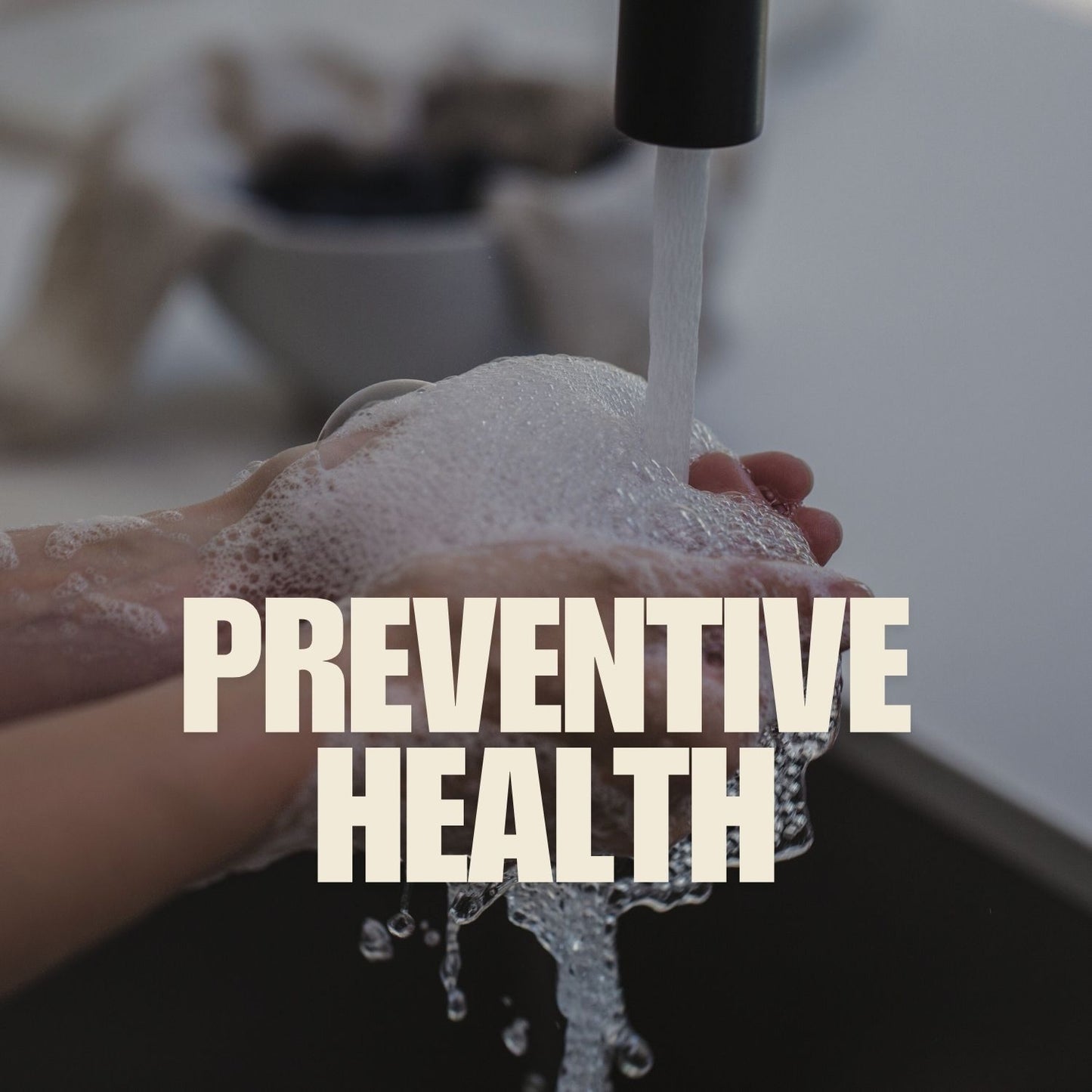ARRAYYAN CARE
Holistic Health and Wellness Services
Holistic Health and Wellness Services
Couldn't load pickup availability
Arrayyan Care offers comprehensive holistic health and wellness services to promote overall well-being. Our experienced healthcare professionals provide personalized care tailored to your individual needs.
Our services include:
Mind-Body Wellness:
* Mindfulness and stress management
* Aromatherapy and massage therapy
Nutritional Counseling:
* Personalized nutrition plans
* Weight management counseling
* Dietary education
Fitness and Exercise:
* Home-based exercise programs
* Fitness assessments
* Lifestyle Coaching
Preventive Health:
* Regular health check-ups and screenings
* Immunization and vaccination services
* Health education and awareness programs
Chronic Disease Management:
* Management of chronic conditions such as diabetes, hypertension, and heart disease
* Medication management and adherence
* Lifestyle modifications
Elderly Care:
* Geriatric care and support
* Dementia and Alzheimer's care
* Palliative care
By combining traditional and alternative therapies, we aim to promote holistic wellness and improve your quality of life.
Share








Description
Mind-Body Wellness: A Holistic Approach to Well-being
Mind-body wellness is a holistic approach to healthcare that focuses on the connection between the mind and body. By addressing both physical and mental health, individuals can achieve optimal well-being.
Mindfulness and Stress Management
Mindfulness is the practice of being present in the moment, without judgment. It involves paying attention to your thoughts, feelings, and sensations.
By practicing mindfulness, you can reduce stress, anxiety, and depression.
Benefits of Mindfulness:
- Reduced stress and anxiety: Mindfulness can help you to calm your mind and reduce stress hormones.
- Improved focus and concentration: Mindfulness can help you to pay attention to the task at hand and improve your focus.
- Enhanced emotional well-being: Mindfulness can help you to manage your emotions and develop a more positive outlook on life.
- Better sleep: Mindfulness can help you to relax and fall asleep more easily.
Stress Management Techniques:
- Deep breathing: Slow, deep breaths can help to calm the nervous system.
- Meditation: Meditation involves focusing the mind on a specific object, thought, or activity.
- Yoga: Yoga combines physical postures, breathing exercises, and meditation.
- Progressive muscle relaxation: This technique involves tensing and relaxing different muscle groups to release tension.
Aromatherapy and Massage Therapy
Aromatherapy and massage therapy are complementary therapies that can be used to promote relaxation and well-being.
Aromatherapy: Aromatherapy involves the use of essential oils to improve physical and emotional health. Essential oils can be inhaled, applied to the skin, or added to bathwater.
Benefits of Aromatherapy:
- Stress relief: Certain essential oils, such as lavender and chamomile, can help to reduce stress and anxiety.
- Improved sleep: Essential oils like lavender and cedarwood can promote relaxation and improve sleep quality.
- Pain relief: Essential oils like peppermint and eucalyptus can help to relieve pain and inflammation.
Massage Therapy:
Massage therapy involves the manipulation of soft tissues to
relieve pain, reduce stress, and improve circulation.
Benefits of Massage Therapy:
- Reduced muscle tension: Massage can help to relieve muscle tension and soreness.
- Improved circulation: Massage can help to increase blood flow and reduce inflammation.
- Stress relief: Massage can help to reduce stress and anxiety.
- Improved sleep: Massage can help you to relax and fall asleep more easily.
By incorporating mindfulness, aromatherapy, and massage therapy into your daily routine, you can improve your overall well-being.
Nutritional Counseling: Your Path to Optimal Health
Personalized Nutrition Plans
A personalized nutrition plan is tailored to your specific needs, goals, and lifestyle. It takes into account factors such as your age, gender, activity level, and any underlying health conditions. A registered dietitian can help you create a meal plan that is both delicious and nutritious.
Benefits of a Personalized Nutrition Plan:
- Weight management: Whether you're looking to lose weight, gain weight, or maintain your current weight, a personalized nutrition plan can help you achieve your goals.
- Improved health: A well-balanced diet can help to reduce the risk of chronic diseases, such as heart disease, stroke, and diabetes.
- Increased energy levels: Eating nutritious foods can give you the energy you need to get through your day.
- Better sleep: A healthy diet can help to improve sleep quality.
- Enhanced mood: Certain nutrients, such as omega-3 fatty acids and vitamin D, can help to improve mood and reduce symptoms of depression and anxiety.
Weight Management Counseling
Weight management counseling can help you to develop healthy eating habits and lifestyle behaviors to achieve and maintain a healthy weight. A registered dietitian can provide you with the tools and support you need to succeed.
Dietary Education
Dietary education can help you to learn about the basics of nutrition, including the importance of carbohydrates, proteins, fats, vitamins, and minerals. A registered dietitian can teach you how to read food labels, make healthy food choices, and prepare nutritious meals.
Key areas of dietary education:
- Portion control: Learning to eat appropriate portion sizes can help you to control your calorie intake.
- Healthy eating habits: Developing healthy eating habits, such as eating breakfast, drinking plenty of water, and limiting processed foods.
- Meal planning: Planning your meals can help you to make healthier food choices.
- Cooking skills: Learning how to cook healthy meals at home can help you to control your diet and save money.
By working with a registered dietitian, you can develop a personalized nutrition plan that will help you achieve your health and wellness goals.
Fitness and Exercise: Your Path to a Healthier You
Home-Based Exercise Programs
A well-structured home-based exercise program can help you achieve your fitness goals without the need for a gym membership. A certified personal trainer can design a personalized program tailored to your specific needs and fitness level.
Benefits of Home-Based Exercise:
- Convenience: Work out on your schedule, in the comfort of your own home.
- Cost-effective: Save money on gym memberships and transportation costs.
- Reduced stress: Exercise can help to reduce stress and anxiety.
- Improved sleep: Regular exercise can help you to sleep better at night.
- Boosted mood: Exercise can help to improve your mood and reduce symptoms of depression.
Key Components of a Home-Based Exercise Program:
- Cardiovascular exercise: Activities that raise your heart rate, such as walking, running, cycling, or swimming.
- Strength training: Exercises that build muscle, such as lifting weights or using resistance bands.
- Flexibility and balance: Activities that improve your range of motion and balance, such as yoga or Pilates.
Fitness Assessments
A fitness assessment can help you to determine your current fitness level and identify areas for improvement. A certified personal trainer can perform a variety of assessments, including:
- Body composition analysis: Measures your body fat percentage and lean muscle mass.
- Cardiovascular fitness test: Measures your heart rate and blood pressure during exercise.
- Strength testing: Measures your muscle strength and endurance.
- Flexibility testing: Measures your range of motion.
Lifestyle Coaching
A lifestyle coach can help you to make sustainable changes to your lifestyle, including your diet, exercise habits, and sleep patterns.
They can provide you with the support and guidance you need to achieve your goals.
Benefits of Lifestyle Coaching:
- Increased motivation: A lifestyle coach can help you stay motivated and on track.
- Improved accountability: Regular check-ins with a coach can help you stay accountable to your goals.
- Enhanced self-confidence: Achieving your fitness goals can boost your self-confidence.
- Reduced stress: A healthy lifestyle can help to reduce stress and anxiety.
- Improved overall well-being: A balanced lifestyle can lead to improved physical and mental health.
By combining home-based exercise, fitness assessments, and lifestyle coaching, you can achieve your fitness goals and improve your overall well-being.
Preventive Health: Your Shield Against Illness
Preventive health is the practice of taking steps to prevent illness and injury. By taking proactive steps to maintain your health, you can reduce your risk of developing chronic diseases and improve your overall
quality of life.
Regular Health Check-ups and Screenings
Regular health check-ups and screenings are essential for early detection of health problems. These check-ups can help identify potential
issues before they become serious.
Common health screenings include:
- Blood pressure: High blood pressure can lead to heart disease, stroke, and kidney disease.
- Cholesterol: High cholesterol can increase your risk of heart disease and stroke.
- Blood sugar: High blood sugar can lead to diabetes.
- Cancer screenings: Regular cancer screenings can help detect cancer early when it is most treatable.
Immunization and Vaccination Services
Immunization and vaccination services are essential for protecting yourself from infectious diseases. Vaccines help your body build immunity to specific diseases, making it less likely that you will become sick.
Common vaccinations include:
- Flu shot: Protects against the flu virus.
- COVID-19 vaccine: Protects against the COVID-19 virus.
- Pneumonia vaccine: Protects against pneumonia.
- Shingles vaccine: Protects against shingles.
Health Education and Awareness Programs
Health education and awareness programs can help you learn about healthy lifestyle habits, such as:
- Healthy eating: Eating a balanced diet can help you maintain a healthy weight and reduce your risk of chronic diseases.
- Regular exercise: Regular physical activity can help you maintain a healthy weight, reduce stress, and improve your overall health.
- Stress management: Effective stress management techniques can help you reduce stress and improve your mental health.
- Smoking cessation: Quitting smoking can significantly reduce your risk of lung cancer, heart disease, and stroke.
- Alcohol consumption: Limiting alcohol consumption can reduce your risk of liver disease, cancer, and other health problems.
By prioritizing preventive health, you can take control of your health and well-being.
Chronic Disease Management: Your Path to a HealthierFuture
Chronic diseases, such as diabetes, hypertension, and heart disease, can significantly impact your quality of life. Effective management of these conditions is crucial for maintaining optimal health.
Management of Chronic Conditions
- Regular Monitoring: Regular check-ups with your healthcare provider are essential to monitor your condition and make necessary adjustments to your treatment plan.
- Medication Adherence: Taking your medications as prescribed is crucial for managing your condition.
- Lifestyle Modifications: Making healthy lifestyle changes, such as eating a healthy diet, exercising regularly, and managing stress, can help improve your overall health and reduce the severity of your symptoms.
Medication Management and Adherence
Understanding Your Medications: It's important to understand your medications, including their purpose, dosage, and potential side effects.
Adherence
Tips:
- Use a pill organizer to keep track of your medications.
- Set reminders to take your medications on time.
- Talk to your doctor about any side effects you may be experiencing.
- Consider using a mobile app to track your medication intake.
Lifestyle Modifications
- Healthy Diet: Eating a healthy diet can help to manage your blood sugar, blood pressure, and cholesterol levels.
- Regular Exercise: Regular physical activity can help to improve your cardiovascular health, reduce stress, and boost your energy levels.
- Stress Management: Stress can exacerbate chronic conditions. Practice stress management techniques such as meditation, yoga, or deep breathing.
- Weight Management: Maintaining a healthy weight can help to improve your overall health and reduce your risk of complications.
- Sleep: Getting enough quality sleep is essential for overall health and well-being.
By working closely with your healthcare provider and making healthy lifestyle choices, you can effectively manage your chronic condition and improve your quality of life.
Elderly Care: Compassionate Supportfor Our Seniors
Elderly care focuses on providing comprehensive support and assistance to older adults, helping them maintain their independence and quality of life.
Geriatric Care and Support
Geriatric care involves a multidisciplinary approach to address the physical, emotional, and social needs of older adults. It may include:
- Daily Living Assistance: Helping with activities of daily living such as bathing, dressing, and grooming.
- Medication Management: Assisting with medication administration and monitoring.
- Meal Preparation: Preparing nutritious meals and snacks.
- Companionship: Providing social interaction and emotional support.
- Transportation: Assisting with transportation to appointments or outings.
Dementia and Alzheimer's Care
Dementia and Alzheimer's disease are progressive neurological disorders that affect memory and cognitive
function. Specialized care for individuals with these conditions focuses on:
- Memory Care: Providing a safe and supportive environment.
- Cognitive Stimulation: Engaging in activities to stimulate the mind and slow cognitive decline.
- Behavioral Management: Managing challenging behaviors and providing appropriate interventions.
- Safety Measures: Implementing safety measures to prevent accidents and injuries.
Palliative Care
Palliative care focuses on providing comfort and support to individuals with serious illnesses. It aims to improve the quality of life for both patients and their families. Palliative care services may include:
- Pain Management: Managing pain and other symptoms.
- Emotional Support: Providing emotional and spiritual support.
- Symptom Management: Addressing physical and psychological symptoms.
- End-of-Life Care: Providing care and support during the end-of-life process.
By providing compassion and comprehensive care, we can help our elderly loved ones live with dignity and grace.
ALL SERVICES
-
Long-Term Patient Care
Regular price From 7,500.00 SARRegular priceUnit price / per -
Remote Consultation
Regular price From 150.00 SARRegular priceUnit price / per -
Physical Therapy Services at Home
Regular price From 350.00 SARRegular priceUnit price / per -
Wound Care Management & Diabetic Foot Care
Regular price From 350.00 SARRegular priceUnit price / per -
Catheter Care & Insertion (NGT/ Foley Cath)
Regular price 380.00 SARRegular priceUnit price / per -
Nebulization Service
Regular price 300.00 SARRegular priceUnit price / per -
Women's Healthcare Services at Home
Regular price From 350.00 SARRegular priceUnit price / per -
Men's Healthcare Services at Home
Regular price From 450.00 SARRegular priceUnit price / per -
Pediatric Homecare Services
Regular price From 250.00 SARRegular priceUnit price / per -
Holistic Health and Wellness Services
Regular price From 300.00 SARRegular priceUnit price / per -
Travel Companion Healthcare Services
Regular price 1,200.00 SARRegular priceUnit price / per -
At-Home Laboratory Services
Regular price From 165.00 SARRegular priceUnit price / per -
Portable Radiology Services
Regular price From 650.00 SARRegular priceUnit price / per -
Wound Care Management Training
Regular price 750.00 SARRegular priceUnit price / per -
Post-Bariatrics Surgery Care (1 Day)
Regular price 800.00 SARRegular priceUnit price / per -
TKR/THR Pre & Post-Operative Care 10 Days
Regular price 12,000.00 SARRegular priceUnit price / per -
Injection Administration at Home
Regular price 250.00 SARRegular priceUnit price / per -
IV Therapy
Regular price 1,350.00 SARRegular priceUnit price / per -
Palliative Care
Regular price 600.00 SARRegular priceUnit price / per -
Medication Management
Regular price 300.00 SARRegular priceUnit price / per -
Newborn Baby Care
Regular price From 350.00 SARRegular priceUnit price / per -
Corporate Wellness Services
Regular price 800.00 SARRegular priceUnit price / per -
Therapeutic Massage
Regular price 350.00 SARRegular priceUnit price / per































